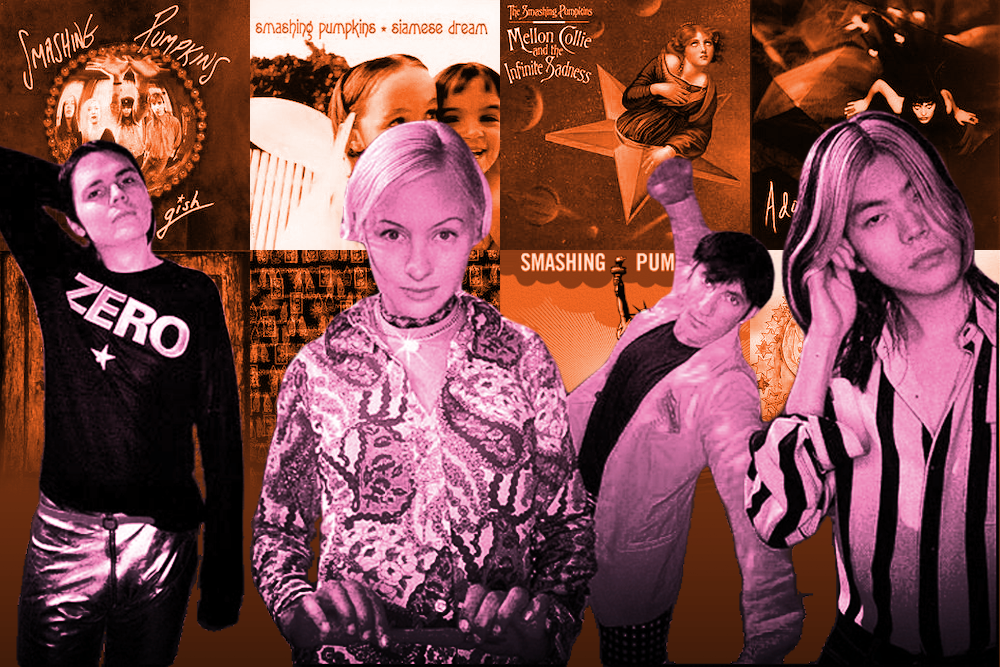24. “Mellon Collie and the Infinite Sadness” (Mellon Collie and the Infinite Sadness, 1995)
No small task to kick off an album longer than most feature films, but Mellon Collie‘s self-titled overture gets the action moving with appropriately cinematic aplomb. The first instrumental cut to appear on a Pumpkins LP, the song’s unforgettable piano melody dances with balletic grace under the moaning synth violins and mellotron, lasting a note-perfect 2:52 before lifting off into the sweeping strings of “Tonight, Tonight.” Listening to it, the overwhelming image is of bald Billy in suit and tails, walking to his piano bench onstage at Lincoln Center, cracking his knuckles, and getting to work. — A.U.
23. “The End Is the Beginning Is the End” (Batman & Robin OST, 1997)
Alternate theory as to why Adore seemed like such a disappointment at the time: Along with “Eye,” “The End is the Beginning is the End” was a soundtrack cut that gave the implication that Smashing Pumpkins would not only endure the onrush of electronic, but thrive, Stratocasters in hand. (Or, in short, they could replace Jimmy Chamberlin and still rock.) Or maybe Adore just got caught up in the bad mojo surrounding “The End is the Beginning is the End”: Hard as it is to believe in 2015, it is possible to make a, big-budget comic book movie so universally reviled that the entire franchise gets shut down for nearly a decade. Which just means Batman & Robin is in the same class as The Last Action Hero and High School High, a phenomenally f**king awful movie that resulted in a totally kick-ass soundtrack. — I.C.
22. “Bodies” (Mellon Collie and the Infinite Sadness, 1995)
This list is filled with quotes that could be described as the quintessential Smashing Pumpkins lyric, but none of them will be more succinct than the conceit that fuels “Bodies”: “Love is suicide.” In the span of three words, Corgan pinpoints a few major themes that flow through his oeuvre: love and death, obviously, but also the romance of fatalism and the fatalism of romance. That he does so over a molten-sludge mix of metal and shoegaze corroborates the belief that the Pumpkins were never more ferocious than they were on Mellon Collie. This is them festering at their trashiest and their finest. — K.M.
21. “Let Me Give the World to You” (Machina II: The Friends & Enemies of Modern Music, 2000)
Everyone who has fond memories of Zwan thinks it sounds like this: Billy Corgan on some PMA tip, pledging mirth and infinite cheer over fuzzy-wuzzy guitars and soft-focus harmonies. There’s this version and one that’s produced by Rick Rubin and features someone other than Jimmy Chamberlin on drums from the Adore reissue — some people believe the latter is superior and the takeaway is that there is a not-insignificant portion of the Smashing Pumpkins’ fanbase that is certifiably insane. — I.C.
20. “Shame” (Adore, 1998)
Billy Corgan wasn’t lacking in personal turmoil to pull from for Adore: He had recently lost his mother to cancer, his marriage dissolved, he dismissed his best friend from his band, and he (understandably) felt as though he had overextended himself as a songwriter. As such, the Pumpkins’ fourth album is their gloomiest, which, no small feat. “Shame,” the most enthralling track on the record’s second half, might read like a cheap approximation of sadness with its opening rhyme, “You’re gonna walk on home / You’re gonna walk alone.” But sung by Corgan at a time when he had singular focus and rendered over the track’s velvety instrumentation, those lines establish the forlorn mood for what is perhaps the most Cure-like song in the SP catalog. Near the end of the six-and-a-half-minute amble, Billy says so long: “Hello, goodbye / You know / You made us cry.” It’s not immediately clear who he’s addressing — if he’s mourning his mom, appealing to his ex-wife, opening up to Chamberlin, or chastising himself, even — but there’s no missing that heartbreak, even in all the darkness. — K.M.
19. “Landslide” (“Disarm,” 1993)
Easy to forget now, but covering this Stevie Nicks classic — which Fleetwood Mac wouldn’t even officially release as a single until it was pulled from their 1997 live album, The Dance — was a much bolder move back in ’94, before the Dixie Chicks, Miley Cyrus, and just about every warbly singer/songwriter on on the planet had their turn at it. The fact that a 27-year-old guy from Chicago with only two albums to his band’s name felt confident enough to take “Landslide” apart and successfully rebuild it with thickened, slightly askew acoustics — not to mention a tear-inducing guitar solo — speaks volumes to SP’s confidence in taking on the classic-rock canon. — R.B.
18. “That’s the Way (My Love Is)” (Zeitgeist, 2007)
The history books might not say as much, but the Smashing Pumpkins’ spacey synth-pop excursions represent some of their finest music — especially after their ’90s heyday. Exhibit A: The exquisite Zeitgeist single “That’s The Way (My Love Is),” a vulnerable, optimistic heart-burster in which Corgan implores a hesitant potential paramour that his aim — and love — is true. His guarantees of “I’m always there for you” even manage to not sound creepy. — A.Z.
17. “Bullet With Butterfly Wings” (Mellon Collie and the Infinite Sadness, 1995)
“Bullet With Butterfly Wings” remains the Pumpkins’ most meme-worthy song, courtesy of Billy Corgan spitting such indelible lyrics as “The world is a vampire” and “Despite all my rage, I am still just a rat in a cage.” Besides that, though, the song harnessed the band’s hard-rock tendencies perhaps better than any previously released song, thanks to an airtight arrangement — which refreshed the loud-quiet-loud ‘90s alt-rock template by amping up the menace, dread, and tension — and a bruising performance from Jimmy Chamberlin that’s aged much better than the “Zero” T-shirt crumpled somewhere in your attic. — A.Z.
16. “Perfect” (Adore, 1998)
The Before Sunset to the Sunrise of “1979,” seeing our once-idealistic heroes older and wiser, but still not totally willing to give up on the naive dreams of youth. The sequel hits many of the same emotional and musical beats as the Pumpkins’ biggest crossover hit — the video even employes the same cast and directors — but if it wasn’t quite exciting enough to follow “1979” to the alt-rock canon, it was quietly devastating enough to leave just as lingering an afterglow for the band’s now-grown fans. “Angel, you know it’s not the end,” Corgan promises, and you really, really want to believe him. — A.U.
15. “Set the Ray to Jerry” (“1979,” 1996)
Yeah, sometimes 70 tracks of overdubbed guitars and DOOM samples and harps and kettle drums get tacked on in post-production, but if you listen to enough of their non-album tracks, it becomes clear that Billy Corgan can write a truly great Smashing Pumpkins song in, like, five minutes. Check the sublime “Set the Ray to Jerry” — it’s little more than a single, softly phased guitar set to a splashy, brushed drum pattern and sauntering bass rumble, with some actual sweet nothings (“I want you and I need you”) and sweet-sounding things that actually mean nothing (“Let roar these fears / From the whore of my tears”). Every self-respecting Smashing Pumpkins fan has tried to make a proper album out of the Aeroplane Flies High boxed set and every one worth taking seriously has this song on it. — I.C.
14. “Tonight, Tonight” (Mellon Collie and the Infinite Sadness, 1995)
Written by Billy Corgan for Billy Corgan as an encouraging note about narrowly escaping his abusive past (“We’ll find a way to offer up the night / The indescribable moments of your life”), “Tonight, Tonight” grabs and bear-hugs your attention with dazzling strings, Billy’s cloud-opening wail, and Jimmy Chamberlin’s looping drum roll, which makes it sound like SP are always on the verge of a big reveal. Each of these elements could have weighed a four-minute single down, but like the mammoth double LP from which it came, the Pumpkins understand how to drape complex themes and instrumental arrangements in affecting directness: “Believe in me as I believe in you.” It’s a straightforward yet indelible sentiment not for a lover or a friend, but for the person who arguably needs your support the most: yourself. — R.B.
13. “Try, Try, Try” (Machina: The Machines of God, 2000)
Divorce “Try, Try, Try” from the larger narrative baked into it — the bonkers concept behind Machina; the junkie romance chronicled in its music video; the limited rotation that clip received on MTV; the fact that it was the final single off of the classic Pumpkins’ last major release — and what you have is a sappy but effervescent and enjoyable pop song. Embrace that larger narrative and what you have is a late-career (for the original roster, anyway) triumph; a swan song of sorts from one of the most commercially successful and artistically ambitious bands of the ‘90s; a plea to fans to “try to hold on to this love.” — K.M.
12. “Muzzle” (Mellon Collie and the Infinite Sadness, 1995)
Last year, Strand of Oaks released “Goshen ‘97,” a very, very meta song where Timothy Showalter rekindles his love for loud guitars after his own personal Adore (the synthy, overproduced Dark Shores) and recalls singing Smashing Pumpkins in the mirror as an angry Indiana teenager. It was a triumphant song that saved the guy’s career. He revealed that he was specifically talking about “Muzzle,” which could not be more perfect, as it contains the two most important Billy Corgan lyrics to coexist in the same song — “I fear my life is ordinary / Just like everyone” and “I know that I was meant for this world.” This ability to mobilize spite into empowerment is why angry teenagers sing Smashing Pumpkins in the mirror and pick up a guitar — to quote one of the Pumpkins’ most obvious progeny, nothing sounds better from the stage than three cheers for sweet revenge on the world. — I.C.
11. “I Am One” (Gish, 1991)
Talk about setting the bar high: The stinging “I Am One” was Smashing Pumpkins’ first single. Although indebted to a variety of sources — heavy-metal heroics, Jane’s Addiction-caliber boogie, psych-noise tangles — the tune somehow transcends its influences. For that, credit the taut, precise fury of Jimmy Chamberlin, and how co-songwriters James Iha and Billy Corgan seamlessly merged their disparate styles into something unburdened by precedent. — A.Z.





